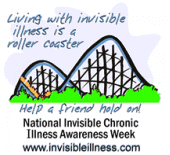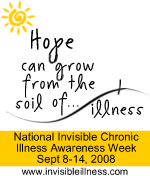Chronic Pain Affects Brain Function
Chronic pain seen altering how brain works
CHICAGO (Reuters) – Brain scans of people in chronic pain show a state of constant activity in areas that should be at rest, U.S. researchers said on Tuesday, a finding that could help explain why pain patients have higher rates of exhaustion, lack of concentration (often called pain fog), depression, anxiety and other disorders. They said chronic pain seems to alter the way people process information that is unrelated to pain.
Chronic Pain Harms Brain's Wiring
FRIDAY, Feb. 8 (HealthDay News) -- Chronic pain can disrupt brain function and cause problems such as disturbed sleep, depression, anxiety and difficulty making simple decisions, a U.S. study finds.
Researchers at Northwestern University's Feinberg School of Medicine in Chicago used functional MRI to scan brain activity in people with chronic low back pain while they tracked a moving bar on a computer screen. They did the same thing with a control group of people with no pain.
In those with no pain, the brain regions displayed a state of equilibrium. When one region was active, the other regions calmed down. But in people with chronic pain, the front region of the cortex mostly associated with emotion "never shuts up," study author Dante Chialvo, an associate research professor of physiology, said in a prepared statement.
This region remains highly active, which wears out neurons and alters their connections to each other. This constant firing of neurons could cause permanent damage.
"We know when neurons fire too much they may change their connections with other neurons or even die, because they can't sustain high activity for so long," Chialvo said.
"If you are a chronic pain patient, you have pain 24 hours a day, seven days a week, every minute of your life. That permanent perception of pain in your brain makes these areas in your brain continuously active. This continuous dysfunction in the equilibrium of the brain can change the wiring forever and could hurt the brain," Chialvo explained.
These changes "may make it harder for you to make a decision or be in a good mood to get up in the morning. It could be that pain produces depression and the other reported abnormalities, because it disturbs the balance of the brain as a whole," he said.
The study was published in the Feb. 6 issue of The Journal of Neuroscience.
Chialvo said the findings show that, along with finding new ways to treat pain, it's also important to develop methods to evaluate and prevent disruption of brain function caused by chronic pain.
More information
The American Academy of Family Physicians has more about chronic pain.
Sources:
http://www.signonsa
http://www.marshall














Hi Sheila,
It's fine that you added me to your blog roll. Also, the call has been in the right column since I posted the submissions. It is right under my about me stuff.
Leslie
Leslie said... Sun Jul 13, 07:06:00 am GMT-6
Hi Sheila,
Thanks for all of your comments. Wow! That's a lot of questions you have for me. Hopefully earlier posts of my blog will help you find the answers, otherwise I'll attempt to answer them myself. As always, thanks for reading!
Leslie
Leslie said... Mon Jul 14, 05:12:00 am GMT-6
Post a Comment